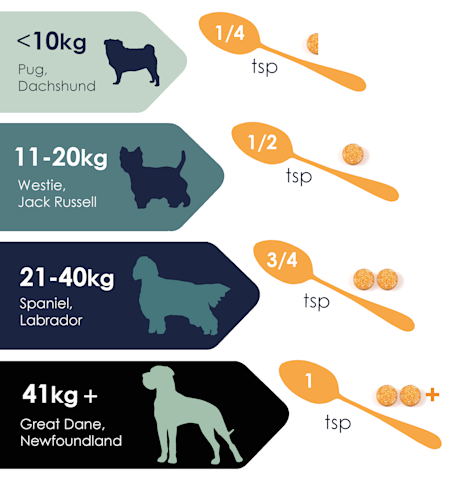Five benefits of turmeric for dogs

Author Gill Shaffer Last updated 20th June 2019
- Pet Health
Curcumin, the active ingredient in turmeric, is a well-studied antioxidant and anti-inflammatory. Based on the effects observed in humans, we have reason to believe turmeric has a number of benefits for dogs – in fact, many people already use it as a joint supplement for dogs – and while we're still waiting for comprehensive studies we've had plenty of positive feedback from our dog-owning customers too.
In this article:
- Turmeric as an anti-inflammatory
- Joint conditions
- Turmeric complements non-steroidal anti-inflammatory drugs (NSAIDs)
- Digestion
- Happiness
- How much turmeric for dogs?
- Is turmeric safe for dogs?
- Summary
Turmeric as an anti-inflammatory
The anti-inflammatory effects of curcumin are well established in human and animal studies.
A study published in the international journal Veterinary immunology and immunopathology shows that curcumin could act as an alternative anti-inflammatory for dogs suffering from osteoarthritis (Colittia et al, 2012).
A 2008 study of dietary curcumin in dogs with osteoarthritis found that it acted as an anti-inflammatory and antioxidant, and confirmed that it modulated immune response (Sgorlon et al, 2008).
An Italian study conducted with horses (mares and foals) achieved the same result, finding that curcumin acted to suppress the cytokines that cause inflammation (Farinacci et al, 2009).
Joint conditions
Thanks to its anti-inflammatory effects, turmeric is often given to dogs with common joint conditions that are caused by inflammation. This includes arthritis in dogs, which affects thousands of pets in the UK and causes stiffness, discomfort and even pain.
Turmeric complements non-steroidal anti-inflammatory drugs (NSAIDs)
Curcumin can provide a potential complement to conventional anti-inflammatory arthritis treatments.
Non-steroidal anti-inflammatory drugs (NSAIDs) such as Metacam and ibuprofen use a mechanism of action that also affects blood flow and clotting and affects the stomach.
Dogs are more vulnerable to the side effects of NSAIDs than humans; you should watch out for anything out of the ordinary. Older dogs and those on some other forms of medication are at greater risk. NSAIDs can cause liver and kidney problems, so you should work with your vet to find a solution if your dog has existing issues.
NSAIDs can also accelerate the destruction of joint cartilage, making arthritis worse in the long run.
These medications are a valuable treatment, but since they often have side effects it makes sense to complement them with other methods, as this may help you to reduce the amount your dog needs.
Natural treatments such as curcumin, gentle exercise and weight loss are therefore a good choice. You should discuss these options with your vet if you have any questions or concerns.
Digestion
Curcumin can help your dog to break down food by stimulating the production of more bile in the liver. This aids in the digestion of fats, which are a major part of a healthy dog's diet, so your dog may feel more comfortable after eating.
Happiness
A healthy dog is a happy dog. While turmeric can't make your dog live forever, If it can help to get your dog's life back on track then he or she is likely to experience an enhanced quality of life.
That's important because happier dogs are likely to live longer. More time to spend with your best friend!
How much turmeric for dogs?
If you decide to try your dog on a turmeric supplement, you should find out how much to give your pet before starting out.
Since dogs come in all shapes and sizes, you should use the chart below to find out how much turmeric you should be giving to your pet.
Turmeric dosage for dogs based on weight
It's also important to give your dog a little turmeric every day, as any positive effects will only occur after you have built up the amount of curcumin in your dog's system.
Is turmeric safe for dogs?

It is important to choose a turmeric formulation for your dog that is highly bioavailable (easy for the body to absorb so that the active ingredient can get to where it is most needed). This ensures more of the beneficial curcumin can be absorbed. Using a bioavailable source also means that you can achieve positive effects with less turmeric, reducing the chance of side effects.
Curcumin, the active ingredient in turmeric, is notoriously difficult to absorb. However, the only way your dog will benefit from eating it is to ensure that it reaches the bloodstream. A carefully formulated source will boost bioavailability by combining the curcumin with other ingredients such as healthy fats.
Summary
With the right dose of turmeric, delivered daily, you can provide your dog with multiple health benefits. The curcumin in turmeric is known to be both an antioxidant and anti-inflammatory, therefore it can be a good alternative to NSAIDs for the treatment of arthritic conditions – especially if your dog has already reacted badly to trying conventional medication.
